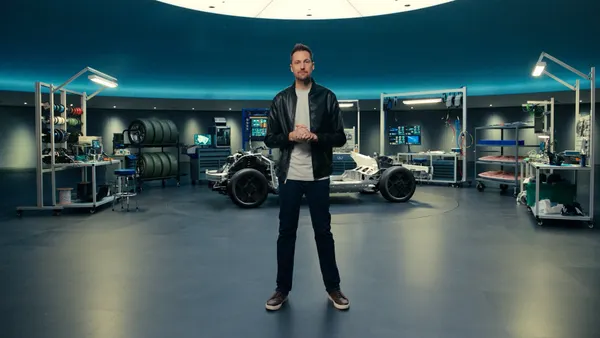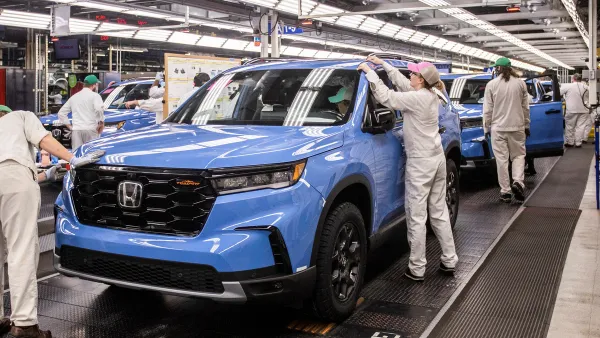Editor's note: This story is part of the WardsAuto digital archive, which may include content that was first published in print, or in different web layouts.
Auto executives take heed. Run afoul of your company’s dealers and it is likely you’ll be looking for a new job.
That is one of the lessons to be learned from Joe Eberhardt’s “resignation” this week.
When dealers become convinced your leadership is bad for their businesses, you might want to start polishing up the resume. It doesn’t happen often, but dealers sometimes have a say in whether an executive stays or goes.
Eberhardt, Chrysler Group’s executive vice president-global sales, marketing and service, is the latest in a line of executives this decade to lose his job after losing the respect of dealers.
Remember Ron Zarrella, General Motor Corp.’s North American president, whose often-ridiculed brand management philosophy and attempts to have the OEM acquire dealerships landed him back at Bausch and Lomb?
To a lesser extent, Ford Motor Co.’s Steve Lyons also is a victim of the dealers’ ire. Lyons, who never was able to connect with dealers, survived only 11 months as the auto maker’s sales chief after serving three years capably as Ford Div. president. Dealers tell Ward's they were not sad to see him leave.
Ironically, Lyons now is building a new Ford dealership in Phoenix, AZ, while Eberhardt is opening a new Mercedes Benz store at a yet-to-be-named location.
Incredibly, Eberhardt, whom dealers complained did not understand their business, was once a dealer. He ran Mercedes-Benz Manhattan, which under his stewardship was one of the leading Mercedes dealerships in the country.
Dealers have been complaining about Eberhardt’s policies for much of the year. As vehicles began piling up on dealers’ lots in late spring, Chrysler refused to ease up on its “pedal to the metal” production schedule while offering weak incentives. Adding to the frustration, the interest rates dealers paid on their floor plans to stock those vehicles continued to increase.
Chrysler dealers, though, understood Eberhardt was in a tough spot and were willing to give him some leeway. But Eberhardt’s mistake was he stopped listening to dealers and acted as if he knew more than they did. At least, that’s the way dealers saw it. In OEM-dealer relationships, that quickly can become an unpardonable sin.
As dealers pleaded for relief, Eberhardt instructed Chrysler and Dodge zone managers to push the retailers even harder to order more vehicles. The situation got so bad, some dealers nicknamed him “No Heart” Eberhardt.
The situation took a drastic turn in early June when dealers met with Chrysler President Tom LaSorda. The meeting, which was requested by dealers, had Eberhardt’s performance on its agenda.
Dealers, frustrated with Eberhardt’s unwillingness to consider their position decided going over his head was the only way to get some relief. Some dealers speculated following the meeting that Eberhardt would either be reined in or be looking for another job.
LaSorda, meanwhile flew to Germany for other meetings. When he returned to the U.S. a few days later, Chrysler dealers were notified that Gary Dilts and Ray Fisher, two sales executives, were “retiring.” It was a decision many dealers felt was unwarranted.
One story circulating among Chrysler dealers is that DaimlerChrysler Chairman Dieter Zetsche believed the June meeting was instigated by Dilts and Fisher as an attempt to undermine Eberhardt. Hence their’ “retirement.”
Media reports of frustrated and unnamed dealers continued to build through the fall. In addition, unreported inventory in Chrysler’s infamous sales bank, first reported by Ward's, created more headaches for senior management. Meanwhile, Chrysler announced production cuts for the fourth quarter and promised to eliminate the sales bank. But the damage was done.
A series of meetings LaSorda and Eberhardt held in early fall with dealers only stoked the anti-Eberhardt feelings. Strong words reportedly were exchanged at some of the meetings as dealers felt Eberhardt was blaming poor sales on them.
LaSorda’s story, however, is different. During the meetings he managed to impress dealers, many who perceive him to be sympathetic to their issues and realistic in how to solve the problems. Several say he is the right person to be leading Chrysler.
Still, one has to wonder how dealers got it so right while the OEM got is so wrong. As Chrysler’s senior management seemed unable to grasp what was happening, its dealers revealed a keen sense of the inevitable while correctly predicting in June that inventory numbers would be “out of whack,” come September. Dealers also predicted a near-open revolt saying they would not be able to take any more inventory.
Through all this, dealers refused to complain on the record for fear of retribution from the OEM. One dealer claimed if his name was attached to a story, “the auditors would be waiting for me at the door in the morning.”
Hearing that, another dealer retorts, “The auditors would be the least of my problems. I’d get crushed.”
This time, it was dealers doing the crushing.









